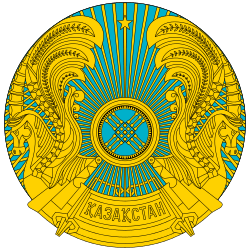Constitution of Kazakhstan
 |
| This article is part of a series on the politics and government of Kazakhstan |
|
|
Politics portal |
The Constitution of the Republic of Kazakhstan (Kazakh: Қазақстан Республикасының Конституциясы, Russian: Конституция Республики Казахстан) is the highest law of Kazakhstan, as stated in Article 4. The Constitution was approved by referendum on 30 August 1995.[1]
Preamble
The preamble of the constitution emphasizes the importance of "freedom, equality and concord" and Kazakhstan's role in the international community.[1]
Section 1, General Provisions
Article 1
Article 1 establishes the state as a secular democracy that values individual "life, rights and freedoms." It outlines social and "political stability, economic development," patriotism, and democracy as the principles upon which the Government serves. This is the first article in which the Parliament is mentioned.[1]
Article 2
Article 2 states that Kazakhstan is a unitary state and the government is presidential. The government has jurisdiction over, and is responsible for, all territory in Kazakhstan. Regional, political divisions, including location of the capital, are left open to lower level legislation. "Republic of Kazakhstan" and "Kazakhstan" are considered one and the same.[1]
Article 3
The government's power is derived from the people and citizens have the right to vote in referendums and free elections. Article 3 establishes provincial government. Representation of the people is a right reserved to the executive and legislative branches. The government is divided between the executive, legislative, and judicial branches. Each branch is prevented from abusing its power by a system of checks and balances. This is the first article to mention constitutional limits on the executive branch.[1]

Article 4
Laws that are in effect include "provisions of the Constitution, the laws corresponding to it, other regulatory legal acts, international treaty and other commitments of the Republic as well as regulatory resolutions of Constitutional Council and the Supreme Court of the Republic." The Constitution is made the highest law. Ratified international treaties supersede national laws and are enforced, except in cases when upon ratification the Parliament recognizes contradictions between treaties and already enacted laws, in which case the treaty will not go into effect until the contradiction has been dealt with through legislation. The government shall publish all laws.[1]
See also
- Government of Kazakhstan
- Politics of Kazakhstan
- Constitution of Russia
- Terrorism and counter-terrorism in Kazakhstan
- Constitutional economics
- Constitutionalism
- Rule according to higher law
References
External links
| ||||||||||||||||||
| ||||||||||||||
| |||||||||||||||||||||||||||||||||||||||||||||||||||||||||||||||||||||